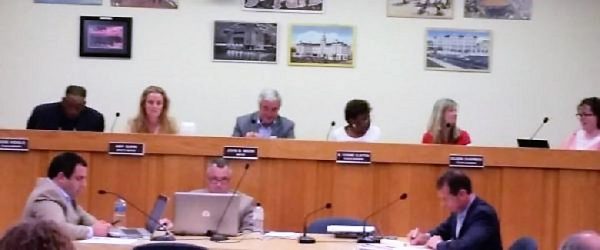Council approves new Short-Term Rental regulations
Measure could be overturned in November '18 via ballot initiative
Investor-owned properties are no longer an option for short-term rentals in Asbury Park.
The Asbury Park City Council on Wednesday unanimously approved an ordinance to limit short-term rentals to owner-occupied primary residences. Short-term rentals are defined as those lasting 30 days or less, which are often arranged through home sharing websites. The ordinance applies to stays outside of already regulated hotels, motels, bed and breakfasts, rooming houses, boarding houses, foster homes, shelters, assisted living facilities and nursing homes.
Properties operated under the 2017 Summer Rental License that are not owner-occupied primary residences are exempt from the owner-occupancy requirement until a transfer of ownership.
The $300 annual permit opens up several new classifications of housing in the short-term market, including renting out a single room in a house and a condominium unit if the homeowners association permits it.
A single unit in a two-family home may be rented short-term if the owner occupies the other unit as their primary residence. Multiple units in a multi-family home can be rented short term provided the homeowner lives in one of them as a primary residence.
Apartment units are prohibited from renting short term from either the owner of the unit or the lessee.
Summer rentals or stays longer than 30 days do not fall under the same regulation requiring the homeowner live on the premises.
The new ordinance requires that short-term renters be at least 21 years of age.
In a packed city council chambers, residents remained largely divided on the matter.
A handful of residents expressed the opinion that the council is moving too fast and should take their time, but according to Deputy Mayor Amy Quinn these new regulations come after months of tense discussions and meetings with various groups.
Quinn and Councilwoman Yvonne Clayton sat on a committee with Planning and Redevelopment Director Michele Alonso, Property Improvement and Neighborhood Preservation Director Robert McKeon and City Manager Michael Capobianco to vet the issue. The committee held two public meetings on the matter after gathering information from Monmouth County Realtors, Airbnb executives, League of Municipalities staff — including the League’s Legislative Committee on Land Use — business owners and residents.
Proponents of the restrictions say they will protect against a potential loss of long-term rental housing, minimize harmful effects of noise and transiency in residential neighborhoods, avoid swaths of “dead zones” in housing blocks awaiting rental in the off-season, keep long-term rental prices on a steady incline rather than a steep one and safeguard the residential character of a city whose Master Plan and various individual redevelopment plans prioritize year-round homeownership.
“We took information we learned and put together an ordinance that we believe preserves the character of residential neighborhoods and allows people to make some money,” Quinn said.
Some residents objected that the council was acting on an issue that does not exist which involves their homes and homeownership. Council members maintain they are being proactive on an issue rather than waiting to be reactive after any negative effects come to light.
“What we are trying to do is be proactive,” said Clayton. “We are not trying to destroy the short-term rental market, we are trying to balance the needs of our visitors with the needs of our residents to protect the integrity and the character of our community.”
A handful of those residents led by Jon Biondo, a lawyer who runs the nonprofit Youth of Malawi, successfully petitioned to have their own ordinance considered by council. Biondo’s ordinance, which does not limit short-term rentals to owner-occupied primary residences, was unanimously voted down.
Last week, Biondo cited case law he believed to be in his favor, which would have blocked the council from voting on the city’s new ordinance until the public had a chance to vote on his through referendum. However, City Attorney Fred Rafetto issued a dissenting opinion and gave council the green light.
Biondo’s ordinance will now come before voters as a question on the November 2018 ballot, unless the petitioners rescind it.
If voters in 2018 vote yes on Biondo’s ordinance it will supersede the newly enacted measures and remain in effect for three years, and the council cannot repeal or amend it during that time.
For now, Biondo loses the ability to short-term rent his refurbished two-family Victorian home on Asbury Avenue. The house sleeps up to 18 and earns between $1000-$1800 for a one night stay. A minimum four-night stay is required, Biondo previously told the Sun. Biondo does have the option to rent out one of the units short-term, provided he moves into the other unit and make it his primary residence.
Most short-term rental transactions take place online through sites like Airbnb, Vacation Rentals by Owner (VRBO), and Home Away, but several Monmouth County Realtors say they still have a hand in the game and are upset about some of the new regulations.
For Robert White, who spoke on behalf of the NJ Realtors Association, the new law is effectively a ban on short-term housing.
He sees limiting multi-family dwellings to rentals longer than 30 days as a “push” by council to force people into long-term rentals. He also opposes the council’s mandate against using lawn signage to promote unit visibility, voiced opposition to allowing the permits of those who rented in 2017 to expire once homeownership changes hands, and sees the $2000 per day penalty for violations – which can be levied on agents or owners – as a business prohibitive move.
“We wish to work with the city on this matter to come to a compromise,” he said. “Such a ban, would it become a law, would force the properties into foreclosure, and recede the progress made in the last four years.”
Instead of banning non-owner occupied short-term rentals, realtors think it should be more regulated.
Derek Minnow-Bloom of the Asbury Park Affordable Housing Coalition hailed the city’s ordinance as a move toward the achievement of socioeconomic justice in housing. Minnow-Bloom said he utilizes Airbnb at his home to help with his taxes and mortgage.
“This is actually just one step in the right direction for justice in affordable housing in our whole city,” he said. “We do have to remember that we are a city where people come from different income brackets.”
Resident Linda Phillips said she supports the ordinance “in principle” as the old law “takes away properties for people who want to live here year-round.” But she has further concerns about a divided community when the ballot referendum campaign is underway.
For Phillips, living with the new ordinance and making amendments as individual issues come to light is a far better conclusion than being stuck with a law for three years that council cannot amend themselves.
“The council has afforded the people of Asbury Park room for compromise,” she said, “ and I will fight to say no on the ballot initiative in November.”
Quinn said the council has not discussed whether it will work with Biondo to have petitioners rescind the ballot initiative.
Biondo, who could not attend the meeting, sent a statement to be read on his behalf by city resident Michael Knipp during a final public hearing on the matter. The full statement is as follows:
One out of every 400 Asbury Park residents is a registered sex offender. Our city has 7 times the state average for violent crime, three times the state average for property crime, and is the poorest city in Monmouth County. Our schools are last in everything, but we spend nearly the most money per child. And from your perch, you think Airbnb is the most pressing issue facing our city. You didn’t campaign on it, any of you, so to set this as your priority is a fraud on the voters.
I hope I am wrong and the City has declined to vote into law its misguided ordinance. We have agreed to disagree on the substance of the measure, and my efforts at compromise were met with silence. But there should be no disagreement on the process. We are a Faulkner Act City, and you are a council subject to those rules. The act is clear. It gives citizens the right to petition the government and provides strict rules for having that petition certified. We met those guidelines. We gathered signatures, we attended all of the meetings, we have acted in good faith from moment one.
By enacting your ordinance today you are confusing voters, especially those 200 plus who signed the petition. They signed to repeal the existing law and now you are changing the existing law. You are moving the goal post, changing the rules of the game, and causing havoc in the law. You will now ask citizens to learn a second system, only to have it be potentially changed in less than a year by ballot initiative. This is ridiculous and unnecessary. Seventy-five percent of people poled do not want you to vote on your law. How can you not listen to that?
There is NO URGENT PROBLEM for you to deal with. Short-term rentals are not currently having any negative impact on the city.
You have provided no evidence of any kind at any meeting, that I am wrong about that. You have much more urgent problems to deal with. I think I’ve noted those above.
Make no mistake, if you insist on pushing forward, we will not relent. I will sue the city for an injunction. If the court does not grant it, you are about to have thousands of angry citizens and a coming summer filled with fines and confusion and frustration. This is not the way to build a community and not the way to govern. When the ballot comes around in November of 2018, I do not see how you think people will not vote YES for change, in every possible sense.
Thank you.















